北师大版(2019)必修第二册Unit 6 The Admirable Lesson 1 A medical pioneer 单词课件(共70张PPT)
文档属性
| 名称 | 北师大版(2019)必修第二册Unit 6 The Admirable Lesson 1 A medical pioneer 单词课件(共70张PPT) |

|
|
| 格式 | pptx | ||
| 文件大小 | 13.1MB | ||
| 资源类型 | 教案 | ||
| 版本资源 | 北师大版(2019) | ||
| 科目 | 英语 | ||
| 更新时间 | 2024-02-24 02:15:36 | ||
图片预览

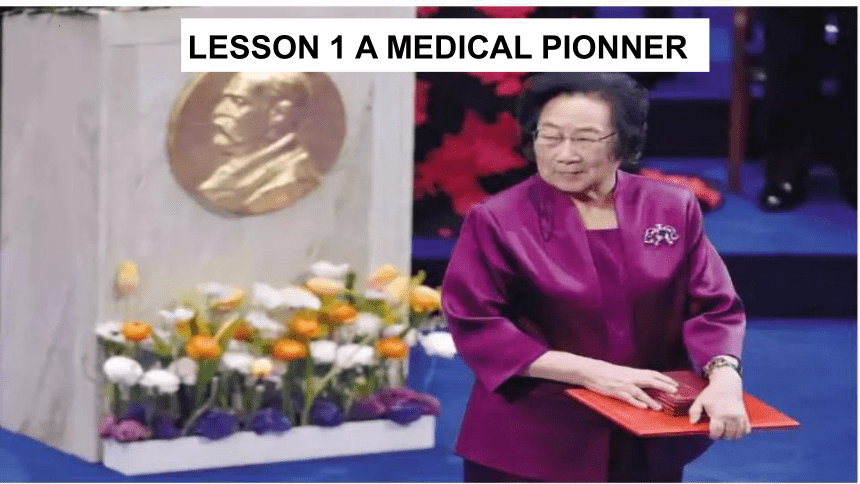
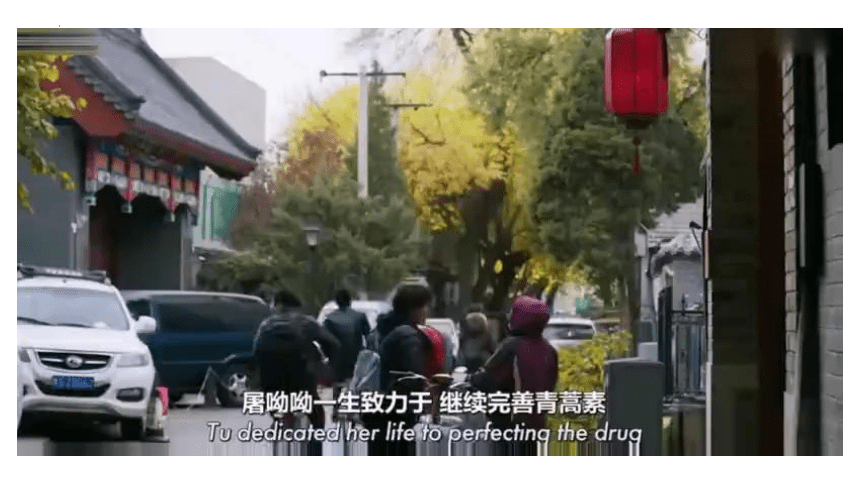
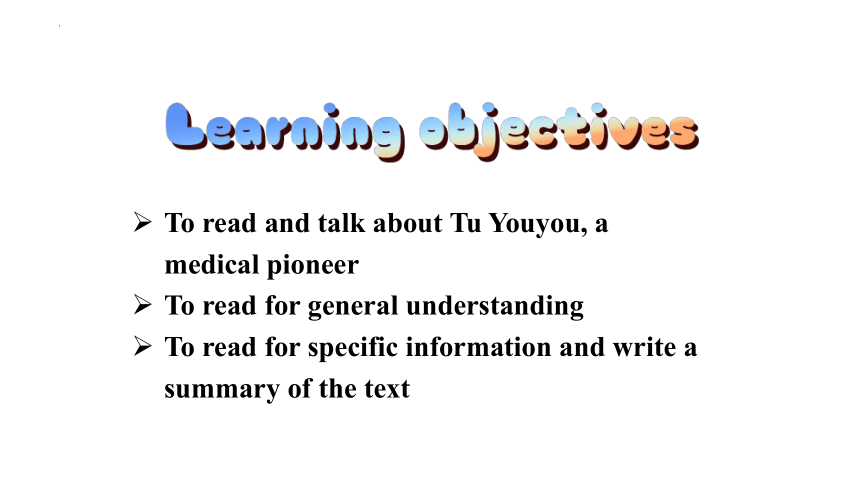
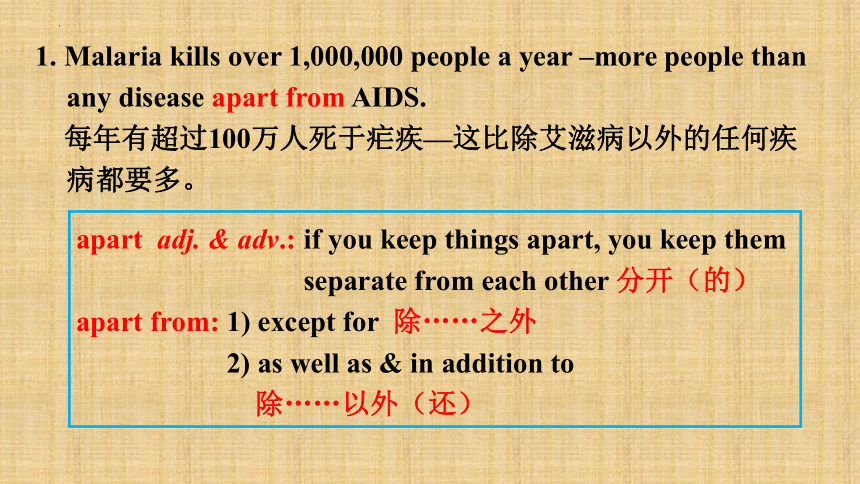
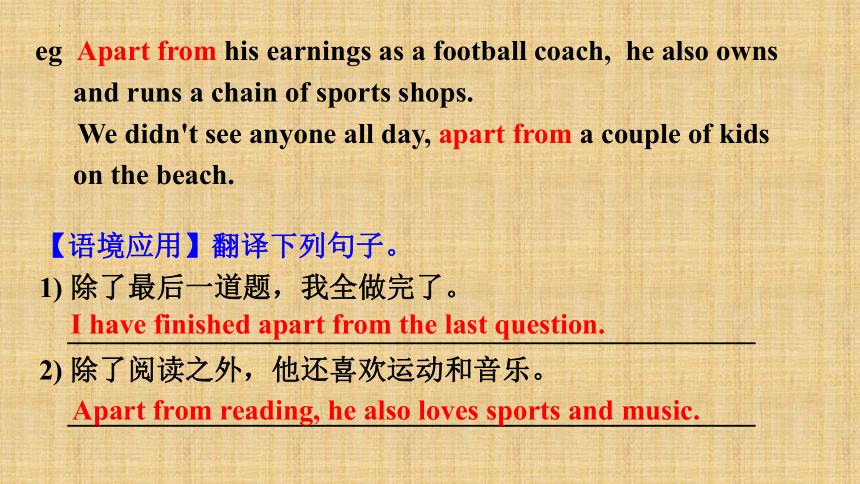
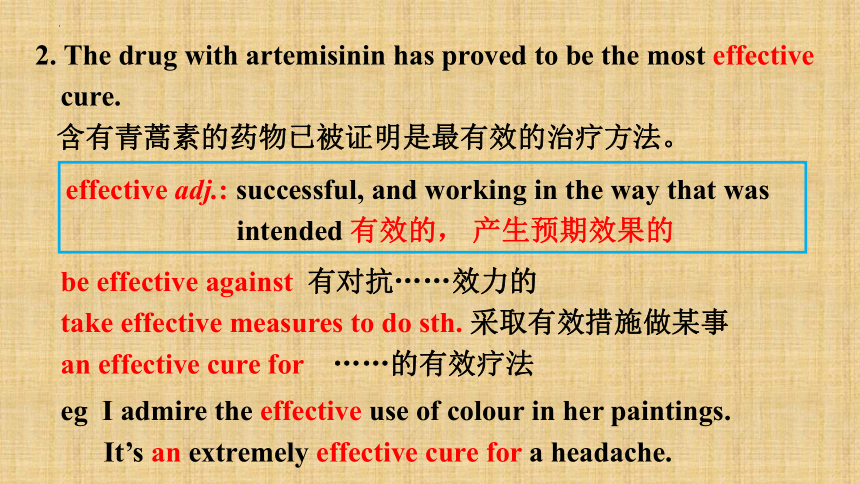
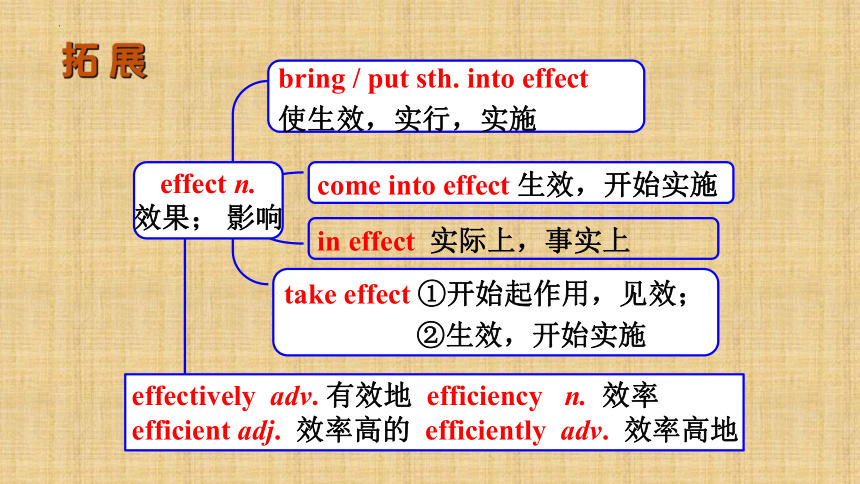
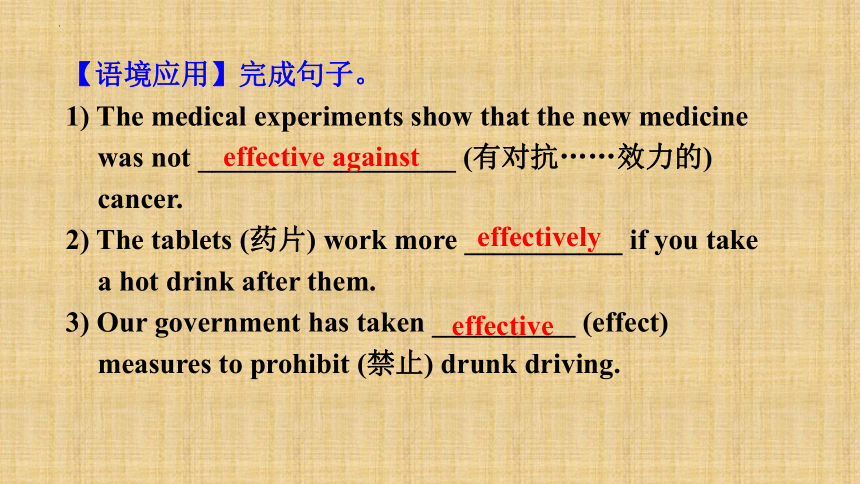
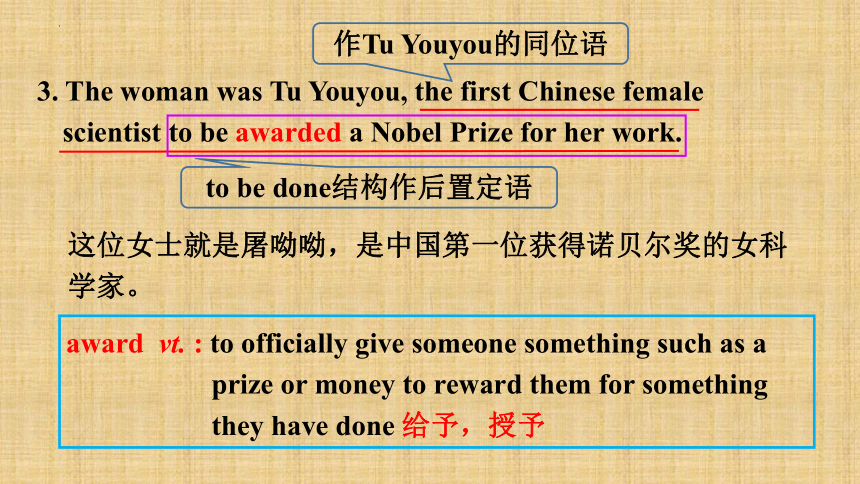
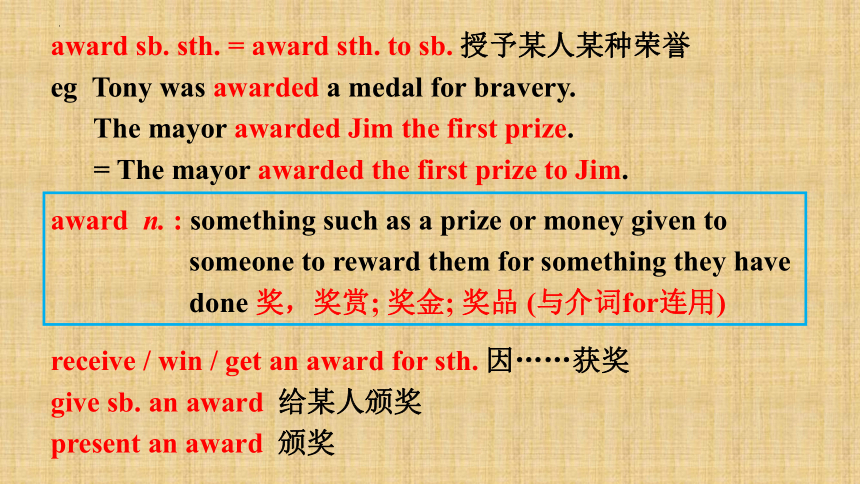
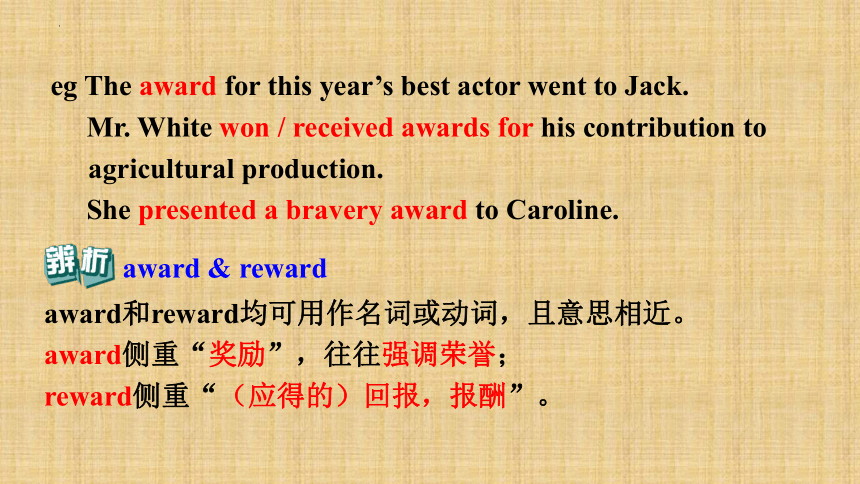
文档简介
(共70张PPT)
UNIT 6 THE ADMIRABLE
LESSON 1 A MEDICAL PIONNER
To read and talk about Tu Youyou, a medical pioneer
To read for general understanding
To read for specific information and write a summary of the text
1. Malaria kills over 1,000,000 people a year –more people than any disease apart from AIDS.
每年有超过100万人死于疟疾—这比除艾滋病以外的任何疾病都要多。
apart adj. & adv.: if you keep things apart, you keep them separate from each other 分开(的)
apart from: 1) except for 除……之外
2) as well as & in addition to
除……以外(还)
eg Apart from his earnings as a football coach, he also owns and runs a chain of sports shops.
We didn't see anyone all day, apart from a couple of kids on the beach.
【语境应用】翻译下列句子。
1) 除了最后一道题,我全做完了。
________________________________________________
2) 除了阅读之外,他还喜欢运动和音乐。
________________________________________________
I have finished apart from the last question.
Apart from reading, he also loves sports and music.
2. The drug with artemisinin has proved to be the most effective cure.
含有青蒿素的药物已被证明是最有效的治疗方法。
effective adj.: successful, and working in the way that was intended 有效的, 产生预期效果的
be effective against 有对抗……效力的
take effective measures to do sth. 采取有效措施做某事
an effective cure for ……的有效疗法
eg I admire the effective use of colour in her paintings.
It’s an extremely effective cure for a headache.
bring / put sth. into effect
使生效,实行,实施
in effect 实际上,事实上
come into effect 生效,开始实施
take effect ①开始起作用,见效;
②生效,开始实施
effect n.
效果; 影响
effectively adv. 有效地 efficiency n. 效率
efficient adj. 效率高的 efficiently adv. 效率高地
【语境应用】完成句子。
1) The medical experiments show that the new medicine was not __________________ (有对抗……效力的) cancer.
2) The tablets (药片) work more ___________ if you take a hot drink after them.
3) Our government has taken __________ (effect) measures to prohibit (禁止) drunk driving.
effective against
effectively
effective
3. The woman was Tu Youyou, the first Chinese female scientist to be awarded a Nobel Prize for her work.
award vt. : to officially give someone something such as a prize or money to reward them for something they have done 给予,授予
作Tu Youyou的同位语
to be done结构作后置定语
这位女士就是屠呦呦,是中国第一位获得诺贝尔奖的女科学家。
award sb. sth. = award sth. to sb. 授予某人某种荣誉
eg Tony was awarded a medal for bravery.
The mayor awarded Jim the first prize.
= The mayor awarded the first prize to Jim.
receive / win / get an award for sth. 因……获奖
give sb. an award 给某人颁奖
present an award 颁奖
award n. : something such as a prize or money given to someone to reward them for something they have done 奖,奖赏; 奖金; 奖品 (与介词for连用)
eg The award for this year’s best actor went to Jack.
Mr. White won / received awards for his contribution to agricultural production.
She presented a bravery award to Caroline.
award和reward均可用作名词或动词,且意思相近。
award侧重“奖励”,往往强调荣誉;
reward侧重“(应得的)回报,报酬”。
award & reward
【语境应用】翻译下列句子。
1) He received an award for outstanding services to the industry.
__________________________________
2) After graduation he was awarded a scholarship to do research.
__________________________________
3) A 100 reward has been offered for the return of the necklace.
__________________________________
他获得了该行业的杰出服务奖。
他毕业后获得了一笔科研奖学金。
已悬赏100英镑寻找项链。
4. A scientist who was on the Nobel Prize Committee called Hans Forssberg explained that “the discovery of artemininin has led to the development of new drugs which have saved the lives of millions.
who引导的定语从句
过去分词短语作后置定语
that引导的宾语从句
which引导的定语从句
诺贝尔委员会的一位名叫汉斯.弗斯拜戈的科学家解释说:“青蒿素的发现使新药得以开发,这些药物挽救了数百万人的生命”。
5. When thanking the Committee for the honour, Tu Youyou said, …
屠呦呦感谢诺委会授予她如此殊荣,她说:……
honour n.: a special award that is given to someone, usually because they have done something good or because they are greatly respected. 荣誉
eg They said they would fight to save the honour of their country.
when引导省略了she was的时间状语从句
honour
n.
v.
荣誉,名誉
荣幸,光荣
尊敬,尊重
感到荣幸
尊敬,崇敬
in honour of 为了纪念
it is an honour to do sth
很荣幸做某事
be / feel honoured to do sth
很荣幸做某事
be honoured for
因……而受尊敬
eg Two firefighters have been honoured for their courage.
I am / feel honoured to be invited to give a speech here.
She received an honour for her services to the community.
The stadium was named in honour of the club's first chairman.
Your coming to visit me has been a great honour.
v. 受到尊敬
v. 感到荣幸
n. 荣誉
n. 崇敬
n. 荣幸
【语境应用】补全下面句子(每空一词)。
1) 今天承蒙邀请到此,深感荣幸。
It was ________ ________ ________ to be invited here today.
2) 他们将为祖国的荣誉而战。
They will fight for ________ ________ ________ ________ ________.
a great honour
the honour of their
country
3) 今天我们在此向那些为我们的祖国献出生命的人们表示敬意。
We are here today to ________ __________ who gave their lives for our country.
honour those/people
6. Later, she studied Chinese medicine for two and a half years with experts in the field from whom she gained a deep knowledge about traditional practices.
介词+whom引导的定语从句,修饰先行词experts,介词from本来和动词gain构成短语,即gain a deep knowledge from experts,这里将其提前。
后来,她跟随该领域的专家学习了两年半的中医,从中对传统医学有了深刻的理解。
gain v. : 1) to obtain or achieve something you want or need 获得,赢得
2) to get an advantage from a situation, opportunity, or event 受益
eg Many of his ideas have gained popular support.
They gained greatly from this experiment.
gain n. : an advantage or improvement 好处,利益
eg The gain is greater than the loss.
7. In 1969, Tu Youyou was chosen to establish a team to find a cure for malaria — a disease that killed millions of people every year.
作malaria的同位语
that引导的定语从句
在1969年,屠呦呦被选中组建一个团队来寻找疟疾的治疗方法,疟疾每年导致数百万人死亡。
establish v. : to start a company, organization, system, etc 建立,设立
eg Our goal is to establish a new research centre in the North.
【拓展】establishment n. 机构,单位;建立,建设
8. The reason why this was difficult was that the team had limited resources.
这项任务困难的原因是团队资源有限。
limited adj.: not very great in amount, number, ability etc 有限的
eg There are only a limited number of tickets available.
My knowledge of the business is limited.
why引导的定语从句,修饰先行词the reason
that引导表语从句
limit
n.
v.
限度,限制
set a limit to / on 限制,控制
限制,限定
limit sth. to sth.
limitless adj. 无限的
【语境应用】完成句子。
1) This first version was a simple design with very _________ (limit) abilities.
2) We should _________________ (限制) what our children can do.
limited
set a limit to/ on
9. However, after hundreds of failed experiments, they eventually came across a promising chemical.
然而,经过数百次失败的实验,他们最终发现了一种有前景的化学物质。
eventually adv. : after a long time, or after a lot of things have happened
终于,最终 (常在句中作状语)
eg There was such a long queue for coffee at the interval that we eventually gave up.
eg The gentleman came across his missing cat while wandering in the street.
come across: If you come across something or someone, you find them or meet them by chance.
偶遇
【拓展】表偶遇的短语:
run across/into, meet with, meet …by chance
10. Tu Youyou was noted for her bravery in being a scientist during a difficult time for science in China, her ability to use old wisdom and new methods to achieve her goals and the fact that her work bridged the Eastern and Western worlds, saving millions of lives.
介词for后有三个宾语
that引导同位语从句,进一步补充说明the fact的具体内容
saving millions of lives是现在分词短语作结果状语
11. Today Tu Youyou continues to conduct research despite her age.
虽然年事已高,屠呦呦仍然继续做研究。
despite prep. : used to say that something happens or is true even though something else might have prevented it 尽管,虽然(后接名词、代词或动词-ing形式)
eg Despite all our efforts to save the school, the authorities decided to close it.
12. “…There is great potential for future advances if these two kinds of wisdom can be fully integrated, ”she said.
她说:“……如果这两种智慧能够完全融合,未来将有巨大的发展潜力。”
potential n. : the possibility that something will develop in a particular way, or have a particular effect
潜力,可能性
eg The company certainly has the potential for growth.
The European marketplace offers excellent potential for increasing sales.
eg We are aware of the potential problems and have taken measures.
potential adj. : likely to develop into a particular type of person or thing in the future 潜在的,可能的
【语境应用】根据汉语意思补全下面句子(每空一词)。
1) 作为一名艺术家,她是很有潜质的。
She ________ ________ ________ as an artist.
2) 该疾病是潜在杀手。
The disease ________ ________ ________ ________.
has great potential
is a potential
killer
eg Recent advances in medical science mean that this illness can now be cured.
I should warn you in advance that I'm not a very good dancer.
advance n. : 1) the forward movement of something, or an improvement or development in something
发展;进步
2) in advance (of sth): before something happens or is expected to happen 预先,提前
【拓展】
advance v. 1) 前进,推进;常与介词 on 或towards连用
2) 进展;发展;进步; (使)提前
adj. 预先的,事先的
advanced adj. 先进的;高级的;后期的
eg The troops were finally given the order to advance on / towards the city.
The time of the meeting has been advanced to ten o’clock.
Please give us advance warning of any changer to the schedule.
We should learn advanced experience from others.
【语境应用】用advance的适当形式填空。
1) We can’t ____________ the time of the performance for it has been planned.
2) The restaurant is very popular. If you want to have dinner there, you’d better book a table in ____________.
3) The ____________ technology makes life for people much easier.
4) We got no _____________ notice of the changes.
advance
advance
advanced
advance
integrate v. : combine or work together in a way that makes something more effective (使)合并,(使)结合
integrate…with 与……成为一体
eg Transport planning should be integrated with energy policy.
运输计划应与能源政策整合起来。
If they want to integrate, that's fine with me.
如果他们想加入,我没有意见。
1. Talk about your understanding about “pioneer”.
A pioneer is similar to a hero but is different because they achieve or discover something no other person has before.
e.g. Christopher Columbus, Neil Armstrong,
Alexander Fleming
Christopher Columbus discovered a new continent; Neil Armstrong was the first man to set foot on the Moon;
Alexander Fleming discovered penicillin, which is used in antibiotics.
2. What are the above pioneers remembered for
3. What do you know about artemisinin Who discovered it
4. View the video to find more.
Read the fact about malaria. Tick (√) the ones you find most striking or interesting.
FACTS ABOUT MALARIA
( ) Malaria is a mosquito-borne and infectious disease.
( ) The word “malaria” comes from the Latin word for “bad air”.
malaria n. 疟疾 infectious adj. 传染的
vomit v. 呕吐 AIDS n. 艾滋病
artemisinin n. 青蒿素 vaccine n. 疫苗
( ) People suffer from high fever, serious vomiting and terrible headaches when they have the disease.
( ) Malaria kills over 1,000,000 people a year – more people than any disease apart from AIDS.
( ) The drug with artemisinin has proved to be the most effective cure.
( ) There is currently no effective vaccine against malaria.
malaria n. 疟疾 infectious adj. 传染的
vomit v. 呕吐 AIDS n. 艾滋病
artemisinin n. 青蒿素 vaccine n. 疫苗
Share with a partner what you know about Tu Youyou. Use the phrases below to help you.
a medical researcher
a Nobel Prize winner
a female scientist
to find a cure for malaria
to discover a life-saving drug called artemisinin
What do you expect to read in a news article about Tu Youyou Ask as many questions as you can.
__________________________________
2. __________________________________
3. __________________________________
What’s the main idea of the passage
This passage is mainly about Tu Youyou has become the first Chinese woman to win a Nobel Prize, for her work in helping to create an anti-malaria (抗疟) medicine and how the 84-year-old’s got the honour.
Read the article and find out how many of your questions are answered.
【课文分析】
本篇文章是一篇新闻报道,新闻报道是以事实为依据,对最近所发生的事件给予明确的、实事求是的报道,其目的是为人们提供最新的信息。新闻报道和新闻评论有时候是结合在一起的,所以在讲述事实之后,可以发表评论。新闻报道的语言要求具体、准确、精炼。人称可以用第三人称或第一人称。时态以一般过去时为主。
第一部分:标题。新闻的标题是对最有新闻价值的内容的浓缩和概括。
第二部分:导语。大体交代新闻事件,主要包括新闻事件发生的时间、地点、所涉及的人物及缘由等。在结构上一般为文章的第一句或第一段,它扼要地揭示出新闻的核心内容。
第三部分:主体。这是新闻的主要部分,它用充足的事实来描述事件过程,对导语的内容进一步展开和阐述。
第四部分:结束语。总结全文或发表评论。在结构上一般为最后一句或一段话。
Read and complete the following information. Then introduce Tu Youyou to your partner based on what you have written.
Basic information
Date of birth: ________________________
Birthplace: __________________________
Education: __________________________
30 December, 1930
Zhejiang Province
Studying medicine at Peking University
Scientific work
Task and difficulties: ___________________________
_____________________________________________
_____________________________________________
Research: ____________________________________
_____________________________________________
_____________________________________________
Discovery: ___________________________________
Task is to find a cure for malaria. Difficulties are limited resources, not enough staff and poor working conditions.
1. tested more than 240,000 chemicals
2. researched hundreds of traditional recipes
3. tested herself
artemisinin
Towards the honour: ____________________
Towards future research: ________________
______________________________________________________________________________
Attitudes
Not interested in fame
a great potential if Chinese and Western medicine can be fully integrated
Fill in the blanks according to the article.
Discovery of artemisinin
Chinese
medicine
Establishing
recipes
limited resources
human subject
influential figures
bravery
Draw a line to match the words and phrases in columns A and B. Then use the phrases to talk about Tu Youyou’s work and achievement.
study
establish
find
research
use
have
come across
discover
be awarded
a cure
hundreds of traditional recipes
Chinese medicine
limited resources
a team
a promising chemical
modern research methods
a Nobel Prize
artemisinin
A
B
Match the information with the year when the event happened.
In 1930
2. In 1969
3. In the
1970s
4. In 2015
5. In 2019
A. The work of Tu Youyou’s team led to an important medical discovery.
B. Tu Youyou was born in Zhejiang Province, China.
C. Tu Youyou was regarded as one of the most important figures of science in the 20th Century.
D. Tu Youyou was asked to set up a team in search of a cure for malaria.
E. Tu Youyou made a speech about the life-saving drug, artemisinin.
B
D
A
E
C
Use three words or phrases to summarise Tu Youyou's personal quality. Give your reasons and find evidence from the text.
Dedicating to science/ Devoted to research: Despite hundreds of failures, she kept on doing research with limited resources and hundreds of failures. Even though she became a world-renowned scientist, she continued to
conduct research despite her age.
Brave: Tu Youyou did research during a difficult time for science in China. She volunteered to be the first human subject to test the effect of the promising chemical.
Creative: She and her team used modern research methods to study traditional Chinese herbs and came across a promising chemical after hundreds of failed experiments.
1. Why is Tu Youyou considered a medical pioneer
Tu Youyou is considered a medical pioneer because she discovered a cure for malaria which no one else had discovered.
2. What typical writing features can you identify in the news article about Tu Youyou
The headline is short and interesting
The introduction summarises Tu Youyou’s
background
The body provides details on her research
Quotes and photographs are included
To learn about relative clauses
To choose correct prepositions and relative pronouns to join two sentences together.
Read the sentences. Tick (√) the sentences that include a relative clause. Underline the clauses.
( ) 1 A scientist who was on the Nobel Prize Committee called Hans Forssberg explained that …
( ) 2 When thanking the Committee for the honor, Tu Youyou said, “This is not only an honor for myself, but also recognition and encouragement for all scientists in China.”
( ) 3 In 1969, Tu Youyou was chosen to establish a team whose goal was to find a cure for malaria …
( ) 4 The reason why this was difficult was that the team had limited resources.
A relative clause is a part of a sentence that has a verb in it and is joined to the rest of the sentence by words such as “who”, “which”, “where”, “when”.
Read the sentences from the article. Which words are used to join the sentences together Circle them. Try to summarise how they are used.
1 Later, she studied Chinese medicine for two and a half years with experts in the field from whom she gained a deep knowledge about traditional practices.
2 They did not have enough staff, and the laboratory in which they worked had poor air quality.
介词 + which/whom引导的定语从句
Relative pronouns can be used as the objects of prepositions. Usually, we use prepositions before which and whom.
关系代词可作介词的宾语。通常在which和whom前加介词,即介词 + which / whom结构。
eg This is the shop from which I bought the book.
He is the teacher with whom I discussed my project.
介词+ which/whom 引导的定语从句中,如果关系代词指物:介词+ which;
如果关系代词指人:介词+ whom。
eg The chair on which you sat has just been painted.
Do you know the lady with whom our manager is talking in the office
介词+which/whom引导定语从句时,介词的选用和它前面的先行词或它后面的从句中的谓语动词的搭配有关。
eg The train on which I’m travelling is for Shanghai.
(travel on the train)
This is the professor from whom I’ve learnt a lot.
(learn from sb)
She’s doing an important project about which I know little.
(know about sth)
Have you seen the telescope with which I studied the sky
(study with the telescope)
在日常英语中,通常把介词放在从句的句末,省略关系代词which或whom。
eg The train (which) I’m travelling on is for Shanghai.
This is the professor (whom) I’ve learnt a lot from.
She’s doing an important project (which) I know little about.
Have you seen the telescope (which) I studied the sky with
Join the pairs of sentences using relative pronouns.
1 We climbed to the top of the mountain. We had a beautiful view from there.
2 David is my friend. I often play tennis with him.
We climbed to the top of the mountain, from where we had a beautiful view.
David is my friend with whom I often play tennis.
3 He has 20 books. Only two of them are interesting.
4 This is quite an interesting job. I really want to apply for it.
He has 20 books, only two of which are interesting.
This is quite an interesting job for which I really want to apply.
1. 地点状语:介词+which=where
The earth on which/where we live is a planet.
2. 时间状语:介词+which=when
I’ll never forget the day on which/when I joined the League.
3. 原因状语:介词+which=why
Is there any reason for which/why you should have a holiday
4. 方式状语:way后常用that代替in which,也可省略that。
I really don’t like the way (that) he talks.
That was the way in which the old lady looked after us.
用适当的“介词+关系代词”填空。
1. Do you like the book ________ she spent $10
2. The school ________ he once studied is very famous.
3. Please pass me the dictionary, the cover ________ is black.
on which
in which
of which
4. I’ll never forget the day __________ we studied together.
5. There are many reasons __________ people like travelling.
6. Two men, neither __________ I had seen before, came to my office yesterday.
on which
for which
of whom
用介词+which/whom改写句子。
1) We are living in an age when many things are done on computer.
= We are living in an age in which many things are done on computer.
2) She moved to Paris, where she lived for five years.
= She moved to Paris, in which she lived for five years.
3) That is no reason why you should leave your parents.
= That is no reason for which you should leave your parents.
Suppose your school wants to choose three most admirable people as role models. You have one minute to persuade the committee to include Tu Youyou. Use at least three relative clauses to present your recommendation.
Tu Youyou is the scientist whose discovery has led to the development of new drugs which have saved millions of lives.
UNIT 6 THE ADMIRABLE
LESSON 1 A MEDICAL PIONNER
To read and talk about Tu Youyou, a medical pioneer
To read for general understanding
To read for specific information and write a summary of the text
1. Malaria kills over 1,000,000 people a year –more people than any disease apart from AIDS.
每年有超过100万人死于疟疾—这比除艾滋病以外的任何疾病都要多。
apart adj. & adv.: if you keep things apart, you keep them separate from each other 分开(的)
apart from: 1) except for 除……之外
2) as well as & in addition to
除……以外(还)
eg Apart from his earnings as a football coach, he also owns and runs a chain of sports shops.
We didn't see anyone all day, apart from a couple of kids on the beach.
【语境应用】翻译下列句子。
1) 除了最后一道题,我全做完了。
________________________________________________
2) 除了阅读之外,他还喜欢运动和音乐。
________________________________________________
I have finished apart from the last question.
Apart from reading, he also loves sports and music.
2. The drug with artemisinin has proved to be the most effective cure.
含有青蒿素的药物已被证明是最有效的治疗方法。
effective adj.: successful, and working in the way that was intended 有效的, 产生预期效果的
be effective against 有对抗……效力的
take effective measures to do sth. 采取有效措施做某事
an effective cure for ……的有效疗法
eg I admire the effective use of colour in her paintings.
It’s an extremely effective cure for a headache.
bring / put sth. into effect
使生效,实行,实施
in effect 实际上,事实上
come into effect 生效,开始实施
take effect ①开始起作用,见效;
②生效,开始实施
effect n.
效果; 影响
effectively adv. 有效地 efficiency n. 效率
efficient adj. 效率高的 efficiently adv. 效率高地
【语境应用】完成句子。
1) The medical experiments show that the new medicine was not __________________ (有对抗……效力的) cancer.
2) The tablets (药片) work more ___________ if you take a hot drink after them.
3) Our government has taken __________ (effect) measures to prohibit (禁止) drunk driving.
effective against
effectively
effective
3. The woman was Tu Youyou, the first Chinese female scientist to be awarded a Nobel Prize for her work.
award vt. : to officially give someone something such as a prize or money to reward them for something they have done 给予,授予
作Tu Youyou的同位语
to be done结构作后置定语
这位女士就是屠呦呦,是中国第一位获得诺贝尔奖的女科学家。
award sb. sth. = award sth. to sb. 授予某人某种荣誉
eg Tony was awarded a medal for bravery.
The mayor awarded Jim the first prize.
= The mayor awarded the first prize to Jim.
receive / win / get an award for sth. 因……获奖
give sb. an award 给某人颁奖
present an award 颁奖
award n. : something such as a prize or money given to someone to reward them for something they have done 奖,奖赏; 奖金; 奖品 (与介词for连用)
eg The award for this year’s best actor went to Jack.
Mr. White won / received awards for his contribution to agricultural production.
She presented a bravery award to Caroline.
award和reward均可用作名词或动词,且意思相近。
award侧重“奖励”,往往强调荣誉;
reward侧重“(应得的)回报,报酬”。
award & reward
【语境应用】翻译下列句子。
1) He received an award for outstanding services to the industry.
__________________________________
2) After graduation he was awarded a scholarship to do research.
__________________________________
3) A 100 reward has been offered for the return of the necklace.
__________________________________
他获得了该行业的杰出服务奖。
他毕业后获得了一笔科研奖学金。
已悬赏100英镑寻找项链。
4. A scientist who was on the Nobel Prize Committee called Hans Forssberg explained that “the discovery of artemininin has led to the development of new drugs which have saved the lives of millions.
who引导的定语从句
过去分词短语作后置定语
that引导的宾语从句
which引导的定语从句
诺贝尔委员会的一位名叫汉斯.弗斯拜戈的科学家解释说:“青蒿素的发现使新药得以开发,这些药物挽救了数百万人的生命”。
5. When thanking the Committee for the honour, Tu Youyou said, …
屠呦呦感谢诺委会授予她如此殊荣,她说:……
honour n.: a special award that is given to someone, usually because they have done something good or because they are greatly respected. 荣誉
eg They said they would fight to save the honour of their country.
when引导省略了she was的时间状语从句
honour
n.
v.
荣誉,名誉
荣幸,光荣
尊敬,尊重
感到荣幸
尊敬,崇敬
in honour of 为了纪念
it is an honour to do sth
很荣幸做某事
be / feel honoured to do sth
很荣幸做某事
be honoured for
因……而受尊敬
eg Two firefighters have been honoured for their courage.
I am / feel honoured to be invited to give a speech here.
She received an honour for her services to the community.
The stadium was named in honour of the club's first chairman.
Your coming to visit me has been a great honour.
v. 受到尊敬
v. 感到荣幸
n. 荣誉
n. 崇敬
n. 荣幸
【语境应用】补全下面句子(每空一词)。
1) 今天承蒙邀请到此,深感荣幸。
It was ________ ________ ________ to be invited here today.
2) 他们将为祖国的荣誉而战。
They will fight for ________ ________ ________ ________ ________.
a great honour
the honour of their
country
3) 今天我们在此向那些为我们的祖国献出生命的人们表示敬意。
We are here today to ________ __________ who gave their lives for our country.
honour those/people
6. Later, she studied Chinese medicine for two and a half years with experts in the field from whom she gained a deep knowledge about traditional practices.
介词+whom引导的定语从句,修饰先行词experts,介词from本来和动词gain构成短语,即gain a deep knowledge from experts,这里将其提前。
后来,她跟随该领域的专家学习了两年半的中医,从中对传统医学有了深刻的理解。
gain v. : 1) to obtain or achieve something you want or need 获得,赢得
2) to get an advantage from a situation, opportunity, or event 受益
eg Many of his ideas have gained popular support.
They gained greatly from this experiment.
gain n. : an advantage or improvement 好处,利益
eg The gain is greater than the loss.
7. In 1969, Tu Youyou was chosen to establish a team to find a cure for malaria — a disease that killed millions of people every year.
作malaria的同位语
that引导的定语从句
在1969年,屠呦呦被选中组建一个团队来寻找疟疾的治疗方法,疟疾每年导致数百万人死亡。
establish v. : to start a company, organization, system, etc 建立,设立
eg Our goal is to establish a new research centre in the North.
【拓展】establishment n. 机构,单位;建立,建设
8. The reason why this was difficult was that the team had limited resources.
这项任务困难的原因是团队资源有限。
limited adj.: not very great in amount, number, ability etc 有限的
eg There are only a limited number of tickets available.
My knowledge of the business is limited.
why引导的定语从句,修饰先行词the reason
that引导表语从句
limit
n.
v.
限度,限制
set a limit to / on 限制,控制
限制,限定
limit sth. to sth.
limitless adj. 无限的
【语境应用】完成句子。
1) This first version was a simple design with very _________ (limit) abilities.
2) We should _________________ (限制) what our children can do.
limited
set a limit to/ on
9. However, after hundreds of failed experiments, they eventually came across a promising chemical.
然而,经过数百次失败的实验,他们最终发现了一种有前景的化学物质。
eventually adv. : after a long time, or after a lot of things have happened
终于,最终 (常在句中作状语)
eg There was such a long queue for coffee at the interval that we eventually gave up.
eg The gentleman came across his missing cat while wandering in the street.
come across: If you come across something or someone, you find them or meet them by chance.
偶遇
【拓展】表偶遇的短语:
run across/into, meet with, meet …by chance
10. Tu Youyou was noted for her bravery in being a scientist during a difficult time for science in China, her ability to use old wisdom and new methods to achieve her goals and the fact that her work bridged the Eastern and Western worlds, saving millions of lives.
介词for后有三个宾语
that引导同位语从句,进一步补充说明the fact的具体内容
saving millions of lives是现在分词短语作结果状语
11. Today Tu Youyou continues to conduct research despite her age.
虽然年事已高,屠呦呦仍然继续做研究。
despite prep. : used to say that something happens or is true even though something else might have prevented it 尽管,虽然(后接名词、代词或动词-ing形式)
eg Despite all our efforts to save the school, the authorities decided to close it.
12. “…There is great potential for future advances if these two kinds of wisdom can be fully integrated, ”she said.
她说:“……如果这两种智慧能够完全融合,未来将有巨大的发展潜力。”
potential n. : the possibility that something will develop in a particular way, or have a particular effect
潜力,可能性
eg The company certainly has the potential for growth.
The European marketplace offers excellent potential for increasing sales.
eg We are aware of the potential problems and have taken measures.
potential adj. : likely to develop into a particular type of person or thing in the future 潜在的,可能的
【语境应用】根据汉语意思补全下面句子(每空一词)。
1) 作为一名艺术家,她是很有潜质的。
She ________ ________ ________ as an artist.
2) 该疾病是潜在杀手。
The disease ________ ________ ________ ________.
has great potential
is a potential
killer
eg Recent advances in medical science mean that this illness can now be cured.
I should warn you in advance that I'm not a very good dancer.
advance n. : 1) the forward movement of something, or an improvement or development in something
发展;进步
2) in advance (of sth): before something happens or is expected to happen 预先,提前
【拓展】
advance v. 1) 前进,推进;常与介词 on 或towards连用
2) 进展;发展;进步; (使)提前
adj. 预先的,事先的
advanced adj. 先进的;高级的;后期的
eg The troops were finally given the order to advance on / towards the city.
The time of the meeting has been advanced to ten o’clock.
Please give us advance warning of any changer to the schedule.
We should learn advanced experience from others.
【语境应用】用advance的适当形式填空。
1) We can’t ____________ the time of the performance for it has been planned.
2) The restaurant is very popular. If you want to have dinner there, you’d better book a table in ____________.
3) The ____________ technology makes life for people much easier.
4) We got no _____________ notice of the changes.
advance
advance
advanced
advance
integrate v. : combine or work together in a way that makes something more effective (使)合并,(使)结合
integrate…with 与……成为一体
eg Transport planning should be integrated with energy policy.
运输计划应与能源政策整合起来。
If they want to integrate, that's fine with me.
如果他们想加入,我没有意见。
1. Talk about your understanding about “pioneer”.
A pioneer is similar to a hero but is different because they achieve or discover something no other person has before.
e.g. Christopher Columbus, Neil Armstrong,
Alexander Fleming
Christopher Columbus discovered a new continent; Neil Armstrong was the first man to set foot on the Moon;
Alexander Fleming discovered penicillin, which is used in antibiotics.
2. What are the above pioneers remembered for
3. What do you know about artemisinin Who discovered it
4. View the video to find more.
Read the fact about malaria. Tick (√) the ones you find most striking or interesting.
FACTS ABOUT MALARIA
( ) Malaria is a mosquito-borne and infectious disease.
( ) The word “malaria” comes from the Latin word for “bad air”.
malaria n. 疟疾 infectious adj. 传染的
vomit v. 呕吐 AIDS n. 艾滋病
artemisinin n. 青蒿素 vaccine n. 疫苗
( ) People suffer from high fever, serious vomiting and terrible headaches when they have the disease.
( ) Malaria kills over 1,000,000 people a year – more people than any disease apart from AIDS.
( ) The drug with artemisinin has proved to be the most effective cure.
( ) There is currently no effective vaccine against malaria.
malaria n. 疟疾 infectious adj. 传染的
vomit v. 呕吐 AIDS n. 艾滋病
artemisinin n. 青蒿素 vaccine n. 疫苗
Share with a partner what you know about Tu Youyou. Use the phrases below to help you.
a medical researcher
a Nobel Prize winner
a female scientist
to find a cure for malaria
to discover a life-saving drug called artemisinin
What do you expect to read in a news article about Tu Youyou Ask as many questions as you can.
__________________________________
2. __________________________________
3. __________________________________
What’s the main idea of the passage
This passage is mainly about Tu Youyou has become the first Chinese woman to win a Nobel Prize, for her work in helping to create an anti-malaria (抗疟) medicine and how the 84-year-old’s got the honour.
Read the article and find out how many of your questions are answered.
【课文分析】
本篇文章是一篇新闻报道,新闻报道是以事实为依据,对最近所发生的事件给予明确的、实事求是的报道,其目的是为人们提供最新的信息。新闻报道和新闻评论有时候是结合在一起的,所以在讲述事实之后,可以发表评论。新闻报道的语言要求具体、准确、精炼。人称可以用第三人称或第一人称。时态以一般过去时为主。
第一部分:标题。新闻的标题是对最有新闻价值的内容的浓缩和概括。
第二部分:导语。大体交代新闻事件,主要包括新闻事件发生的时间、地点、所涉及的人物及缘由等。在结构上一般为文章的第一句或第一段,它扼要地揭示出新闻的核心内容。
第三部分:主体。这是新闻的主要部分,它用充足的事实来描述事件过程,对导语的内容进一步展开和阐述。
第四部分:结束语。总结全文或发表评论。在结构上一般为最后一句或一段话。
Read and complete the following information. Then introduce Tu Youyou to your partner based on what you have written.
Basic information
Date of birth: ________________________
Birthplace: __________________________
Education: __________________________
30 December, 1930
Zhejiang Province
Studying medicine at Peking University
Scientific work
Task and difficulties: ___________________________
_____________________________________________
_____________________________________________
Research: ____________________________________
_____________________________________________
_____________________________________________
Discovery: ___________________________________
Task is to find a cure for malaria. Difficulties are limited resources, not enough staff and poor working conditions.
1. tested more than 240,000 chemicals
2. researched hundreds of traditional recipes
3. tested herself
artemisinin
Towards the honour: ____________________
Towards future research: ________________
______________________________________________________________________________
Attitudes
Not interested in fame
a great potential if Chinese and Western medicine can be fully integrated
Fill in the blanks according to the article.
Discovery of artemisinin
Chinese
medicine
Establishing
recipes
limited resources
human subject
influential figures
bravery
Draw a line to match the words and phrases in columns A and B. Then use the phrases to talk about Tu Youyou’s work and achievement.
study
establish
find
research
use
have
come across
discover
be awarded
a cure
hundreds of traditional recipes
Chinese medicine
limited resources
a team
a promising chemical
modern research methods
a Nobel Prize
artemisinin
A
B
Match the information with the year when the event happened.
In 1930
2. In 1969
3. In the
1970s
4. In 2015
5. In 2019
A. The work of Tu Youyou’s team led to an important medical discovery.
B. Tu Youyou was born in Zhejiang Province, China.
C. Tu Youyou was regarded as one of the most important figures of science in the 20th Century.
D. Tu Youyou was asked to set up a team in search of a cure for malaria.
E. Tu Youyou made a speech about the life-saving drug, artemisinin.
B
D
A
E
C
Use three words or phrases to summarise Tu Youyou's personal quality. Give your reasons and find evidence from the text.
Dedicating to science/ Devoted to research: Despite hundreds of failures, she kept on doing research with limited resources and hundreds of failures. Even though she became a world-renowned scientist, she continued to
conduct research despite her age.
Brave: Tu Youyou did research during a difficult time for science in China. She volunteered to be the first human subject to test the effect of the promising chemical.
Creative: She and her team used modern research methods to study traditional Chinese herbs and came across a promising chemical after hundreds of failed experiments.
1. Why is Tu Youyou considered a medical pioneer
Tu Youyou is considered a medical pioneer because she discovered a cure for malaria which no one else had discovered.
2. What typical writing features can you identify in the news article about Tu Youyou
The headline is short and interesting
The introduction summarises Tu Youyou’s
background
The body provides details on her research
Quotes and photographs are included
To learn about relative clauses
To choose correct prepositions and relative pronouns to join two sentences together.
Read the sentences. Tick (√) the sentences that include a relative clause. Underline the clauses.
( ) 1 A scientist who was on the Nobel Prize Committee called Hans Forssberg explained that …
( ) 2 When thanking the Committee for the honor, Tu Youyou said, “This is not only an honor for myself, but also recognition and encouragement for all scientists in China.”
( ) 3 In 1969, Tu Youyou was chosen to establish a team whose goal was to find a cure for malaria …
( ) 4 The reason why this was difficult was that the team had limited resources.
A relative clause is a part of a sentence that has a verb in it and is joined to the rest of the sentence by words such as “who”, “which”, “where”, “when”.
Read the sentences from the article. Which words are used to join the sentences together Circle them. Try to summarise how they are used.
1 Later, she studied Chinese medicine for two and a half years with experts in the field from whom she gained a deep knowledge about traditional practices.
2 They did not have enough staff, and the laboratory in which they worked had poor air quality.
介词 + which/whom引导的定语从句
Relative pronouns can be used as the objects of prepositions. Usually, we use prepositions before which and whom.
关系代词可作介词的宾语。通常在which和whom前加介词,即介词 + which / whom结构。
eg This is the shop from which I bought the book.
He is the teacher with whom I discussed my project.
介词+ which/whom 引导的定语从句中,如果关系代词指物:介词+ which;
如果关系代词指人:介词+ whom。
eg The chair on which you sat has just been painted.
Do you know the lady with whom our manager is talking in the office
介词+which/whom引导定语从句时,介词的选用和它前面的先行词或它后面的从句中的谓语动词的搭配有关。
eg The train on which I’m travelling is for Shanghai.
(travel on the train)
This is the professor from whom I’ve learnt a lot.
(learn from sb)
She’s doing an important project about which I know little.
(know about sth)
Have you seen the telescope with which I studied the sky
(study with the telescope)
在日常英语中,通常把介词放在从句的句末,省略关系代词which或whom。
eg The train (which) I’m travelling on is for Shanghai.
This is the professor (whom) I’ve learnt a lot from.
She’s doing an important project (which) I know little about.
Have you seen the telescope (which) I studied the sky with
Join the pairs of sentences using relative pronouns.
1 We climbed to the top of the mountain. We had a beautiful view from there.
2 David is my friend. I often play tennis with him.
We climbed to the top of the mountain, from where we had a beautiful view.
David is my friend with whom I often play tennis.
3 He has 20 books. Only two of them are interesting.
4 This is quite an interesting job. I really want to apply for it.
He has 20 books, only two of which are interesting.
This is quite an interesting job for which I really want to apply.
1. 地点状语:介词+which=where
The earth on which/where we live is a planet.
2. 时间状语:介词+which=when
I’ll never forget the day on which/when I joined the League.
3. 原因状语:介词+which=why
Is there any reason for which/why you should have a holiday
4. 方式状语:way后常用that代替in which,也可省略that。
I really don’t like the way (that) he talks.
That was the way in which the old lady looked after us.
用适当的“介词+关系代词”填空。
1. Do you like the book ________ she spent $10
2. The school ________ he once studied is very famous.
3. Please pass me the dictionary, the cover ________ is black.
on which
in which
of which
4. I’ll never forget the day __________ we studied together.
5. There are many reasons __________ people like travelling.
6. Two men, neither __________ I had seen before, came to my office yesterday.
on which
for which
of whom
用介词+which/whom改写句子。
1) We are living in an age when many things are done on computer.
= We are living in an age in which many things are done on computer.
2) She moved to Paris, where she lived for five years.
= She moved to Paris, in which she lived for five years.
3) That is no reason why you should leave your parents.
= That is no reason for which you should leave your parents.
Suppose your school wants to choose three most admirable people as role models. You have one minute to persuade the committee to include Tu Youyou. Use at least three relative clauses to present your recommendation.
Tu Youyou is the scientist whose discovery has led to the development of new drugs which have saved millions of lives.
同课章节目录
- Unit 4 Information technology
- Lesson 1 Avatars
- Lesson 2 Apps
- Lesson 3 Internet and Friendships
- Unit 5 Humans and nature
- Lesson 1 A Sea Story
- Lesson 2 Professional Rescue Team
- Lesson 3 Race to the Pole
- Unit 6 The admirable
- Lesson 1 A Medical Pioneer
- Lesson 2 History Makers
- Lesson 3 The Superhero Behind Superman
